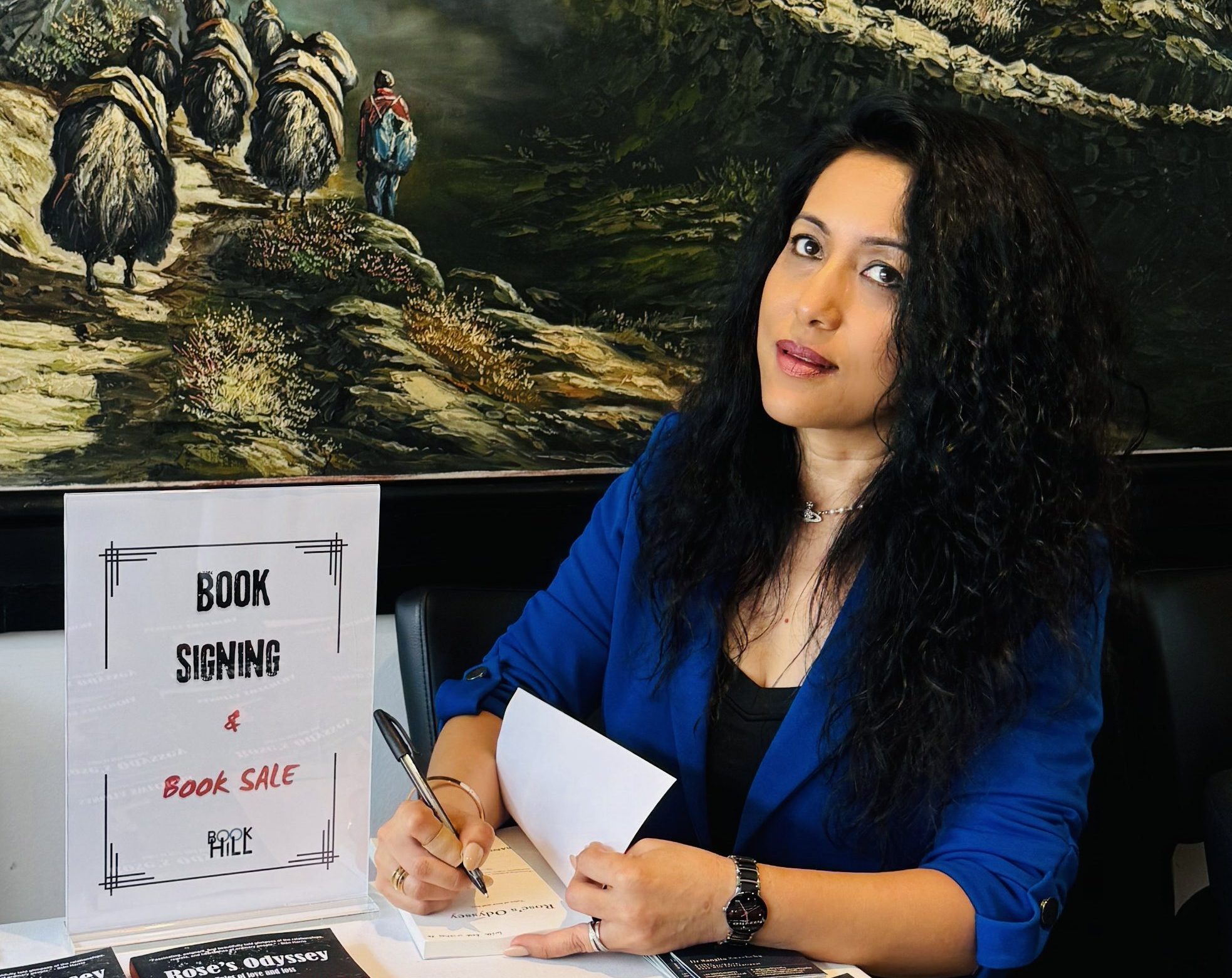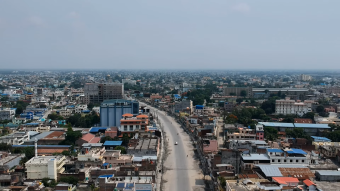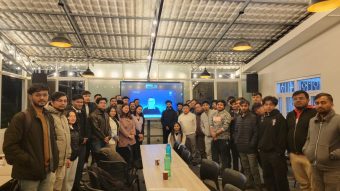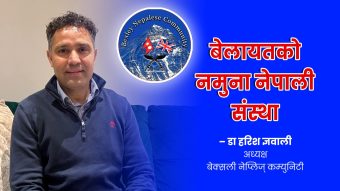Swechcha’s Global Journey: Showcasing Nepali Literature Beyond Borders



London: Though her professional life unfolds in the United Kingdom, her heart remains firmly rooted in Nepal. Writer, poet and researcher Dr Sangita Shrestha ‘Swechcha’, who has lived in the UK for nearly two decades, has been actively championing Nepali literature on the international stage.
Sangita, who also serves as Chair of the International Association of Art and Culture for Peace (IAACP) at the Universal Peace Federation UK, says, “Nepali literature is rich in itself, but its visibility beyond Nepal needs strengthening. I have been committed to promoting it globally because literature is an important part of our identity.”
Swechcha’s poems, stories and articles have been featured in diverse literary journals and online platforms worldwide.
Creativity, Social Awareness, and International Recognition
Having nurtured a passion for creative writing from a young age, Dr Swechcha made her debut in Nepali literature at just 18 with her novel Pakhalieko Siundo (Washed Vermillion). The novel, which explores sensitive social issues such as human trafficking and violence against women, received widespread praise at the time.
The novel was republished in 2024 by Book Hill Publications under the title Seto Siundo, and Swechcha is currently translating it into English herself.
Recently, Novel London, a UK-based literary organisation, selected the English translation of the first chapter of Seto Siundo (Washed Vermillion) for a reading session, praising it highly. A portion of the first chapter that was read is now archived on Novel London’s YouTube channel.
Her other notable works include Nepali short story collections such as Gulafsangako Prem and Asahamatika Pailaharu. In addition, the English translation of Gulafsangako Prem, published as Rose’s Odyssey: Tales of Love and Loss (2024), along with the books she has co-edited — The Himalayan Sunrise: Exploring Nepal’s Literary Horizon (with Karen Van Drie) and A Glimpse Into My Country (with Andrée Roby) — have helped bring Nepali literature to an international audience.
Dr Swechcha is also a prominent voice in international literary circles. She served as Guest Editor for “Nepali Literature Month – Nov 2019” at the Global Literature in Libraries Initiative (GLLI), a United States-based organisation dedicated to promoting world literature.
“It was a golden opportunity for Nepali literature. Being able to present, every day for a month, poems by various writers, interviews with Nepali literary figures, book reviews, and other works reflecting different facets of Nepali literature was a matter of pride for me,” says Sangita.
Swechcha is also the founder and editor of Book Hill International, a UK-based publishing house dedicated to promoting Nepali literature globally. This publishing house is affiliated with Book Hill, a leading literary publisher in Nepal.
In recognition of her contributions to Nepali literature, Swechcha was awarded the Navaratna Naari Award in 2023 by the International Nepali Literary Society (ANESAS).
Beyond literary writing, Dr Sangita’s contributions in the field of international development are noteworthy. With nearly two decades of experience in international development communication, her articles, news stories, and interviews have been published in various international media outlets, including BBC, CNN, National Geographic Channel, USA Radio Network, Medical Xpress, Phys.org, as well as newspapers and magazines across Europe, America, Asia, and Africa.
In addition to her work in international development communications, her efforts in empowering women through education, particularly for those affected by poverty in Africa and Asia, have been recognised by the UK-based international organisation Universal Peace Federation, which honoured her with the “Ambassador for Peace” award.
Swechcha’s writing is not only a form of creative expression but also a powerful medium for social change and awareness. Her stories often offer a profound portrayal of women’s pain, struggle, resilience, social injustice, and the human condition.
Rose’s Odyssey — A profound portrayal of love, pain and human psychology
Her short story collection Rose’s Odyssey: Tales of Love and Loss, translated by Jayant Sharma, comprises 20 stories that move across both geographical and emotional landscapes. Her writing vividly reflects her experiences in Nepal, her time in Australia, and her life in the UK.
Dr Swechcha writes not only with a distinctly female or feminist voice but also from a deeply humanitarian perspective. Her stories are realistic, vivid, and emotionally resonant.
Critics have interpreted the title story, Rose’s Odyssey, as an intimate contemporary echo of Homer’s Odyssey. In it, she portrays emotions such as love, betrayal, revenge, and remorse with striking psychological depth.
The final story of the collection, written in a diary style, presents the highs and lows of migrant life — its loneliness, inner conflict, and quiet resilience — through the perspective of a male character. Critics say that a woman writer adopting such a viewpoint demonstrates boldness and originality.
The shortest story, Ram Maya, addresses the issue of human trafficking and leaves a profound impact despite its brevity.
Another story, Shattered Dream, has gained notable international recognition for its exploration of women’s autonomy and existence, and has been compared to Toni Morrison’s The Bluest Eye.
International Acclaim and Impact
Rose’s Odyssey has received highly positive reviews on Amazon and across international media. Dr Tamar Mikhail described the collection as “a mesmerising experience”, while reviewers Ketan Varia and Nirmala Karanjeet highlighted its “subtle depiction of life’s unexpected turns and human psychology.”
Similarly, Shahd Mahnavi, author of White Shoes, praised the book as “a profound exploration of human emotion and a reflective journey through love, betrayal and relationships.”
According to critic and London-based poet Dr Rupak Shrestha, “Dr Swechcha’s Rose’s Odyssey is an impressive example of the international evolution of Nepali literature. She has captured the essence of human emotion in a way that transcends cultural boundaries.”
Taking Nepali Literary Heritage to the Global Stage
Currently based in the UK, Dr Sangita Swechcha continues to promote Nepali language and culture through her writing, research, editing and international collaborations.
“Literature should not be confined by boundaries. My goal is for the soul of Nepali literature to travel across the world,” she says.
Critics note that Dr Swechcha has emerged as a leading voice shaping the contemporary movement to elevate Nepali literature globally, consistently weaving together culture, emotion, and identity through her efforts.
Dr Sangita completed her PhD in Environmental Communication from the University of Surrey, UK. She also holds a Master’s degree in Anthropology from Tribhuvan University and a Diploma in Software Development from Holmesglen Institute, Australia.
She was awarded the Mahendra Vidya Bhushan in 2000 and the Nepal Vidya Bhushan in 2014—both gold medals recognising her academic achievements—and her literary and scholarly contributions have received wide attention from Nepali as well as international media.
Her interviews and special features have appeared on BBC, Global Voices, ALB UK Global Television, Global USA TV, Sussex Express, London World News, and in major media outlets across Nepal, India and Bangladesh.
For the past five years, Swechcha has been associated with Global Voices, published from the Netherlands, as a Contributing Author. She interviews personalities affiliated to Nepali literature, world literature and international development, bringing their stories to an international readership.
Her Global Voices articles have been translated into numerous languages, including Russian, Italian, French, Romanian, Chinese, Greek, Spanish, Ukrainian, Portuguese, Esperanto, Igbo, Malagasy, Arabic, Bangla, Yoruba, Serbian, Polish, Czech and others.
Sangita says, “It is a matter of great joy that interviews and articles related to Nepal and Nepali literature are reaching readers across so many languages.”
Her Wikipedia page has also been created with the support of contributors from around the world.
— Narendra Basnet












